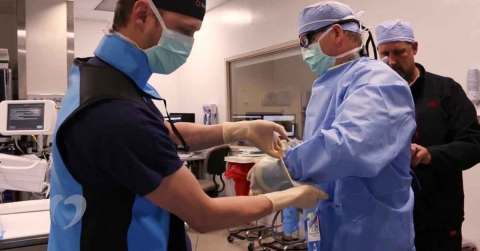Can Surgery Cause Heart Rhythm Issues?

If you are preparing for heart surgery or have recently had heart surgery, you may be thinking about potential complications and wondering what to expect for your recovery period. Did you know that many patients experience a heart rhythm issue following heart surgery?
The most common type of heart rhythm issue after surgery is atrial fibrillation. Up to 40% of patients who have heart surgery experience post-operative AFib. Inflammation in the chest after surgery is the suspected cause of the arrhythmia, and many times the heartbeat returns to normal as healing occurs.
What is atrial fibrillation?
Atrial fibrillation is a specific type of irregular heartbeat where the upper chambers of the heart beat out of sync with the lower chambers. A patient might notice symptoms such as irregular heartbeat, heart palpitations, shortness of breath, fatigue, and weakness. Some types of arrhythmias are chronic, but post-operative AFib often resolves on its own by the time the chest heals.
What can be done to prevent it?
As you prepare to have heart surgery, you may be looking for ways to reduce the chances of complications. Managing your overall risk factors for AFib is the best way to reduce your risk for post-operative atrial fibrillation as well. Although some risk factors are impossible to eliminate, keeping your body as healthy as possible before surgery will reduce the likelihood of post-operative AFib and other complications from surgery.
- Manage your chronic conditions. Thyroid problems, anemia, diabetes, and high blood pressure are among the risk factors for AFib. If you have any of these or other chronic conditions, treating them prior to surgery may reduce your risk for complications. This includes taking any prescribed medications and following your doctor’s advice on managing these conditions.
- Eat healthy foods and exercise. The healthier you are going into surgery, the healthier you are coming out of surgery. Eat a heart healthy diet and make exercise part of your daily routine. Aim for 30 minutes a day of moderate exercise at least five days a week.
- Limit stress. Stress can be a trigger for atrial fibrillation, and we know that having surgery can be a stressful event. Managing stress includes physical stress on your body as well as mental or emotional stress in your life. After surgery, managing your pain reduces stress on your body, and having the right support systems in place can help manage mental and emotional stress.
Treatment for post-operative arrythmias
Treatment for arrhythmias after surgery is similar to treatment for any other heart rhythm issues and focuses on restoring and maintaining your heart’s normal rhythm. In some cases, your heart rhythm will correct on its own as you heal and inflammation subsides. Other times, treatments such as medication may be needed to restore a normal heartbeat.
If you experience symptoms of an irregular heart rhythm after surgery, contact your Oklahoma Heart Hospital physician. Even though it’s common and often corrects on its own, post-operate atrial fibrillation can be serious and is sometimes associated with higher risk for other complications after surgery.




